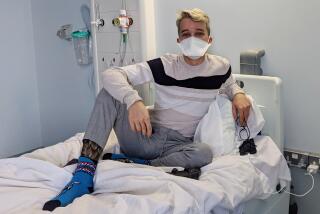Medical Volunteers: Check the Facts First
- Share via
Thinking of volunteering for a study?
If being a “guinea pig” has crossed your mind, undoubtedly a number of questions have, too. Will you know in advance just what the researchers will want you to do, for instance, or is the study you are interested in a legitimate one?
No one should agree to participate in a study without first asking such questions--and getting answers. Legitimate researchers--whether associated with a university, a hospital or a private research group--expect to be asked for details about their project.
“The researchers are supposed to explain the test to you, and they are supposed to explain the informed consent form and give you a reasonable amount of time to study it before you sign,” says Mary Michael Gloss, research administrator for the Human Volunteers Research Committee at the University of Maryland. “They are not supposed to pounce on you to ‘sign it now.’ ”
Ask for Protocol
Also ask to read a copy of the protocol, or plan, of the project, Gloss says. If you don’t understand it, she says, “ask if someone outside the research organization can review it for you, or call the review committee for an explanation.
“And ask all the questions you can think of.”
Some of those questions might be:
--Who is sponsoring the research? And what is their track record?
--Who is on the review committee? What are the reputations and expertise of the panelists?
--What is the goal of the research?
--Who will benefit from the research? What evidence is there to suggest the research will be beneficial?
--What are the possible physical, social or psychological risks?
--Is it possible that ill effects will show up after the test is over? Months or even years later?
What About Safeguards?
--What safeguards are in place? How are volunteers to be monitored, and by whom? What kind of response can volunteers expect if they have ill effects?
-- Is this a double-blind or comparative study in which some people get a new medicine or treatment while others are given an older treatment or a placebo? On what basis is the selection made? Is there a point at which volunteers will be switched from placebo to medicine?
--What, exactly, will volunteers have to do?
--Will the test be an inpatient or outpatient program? If inpatient, what are the accommodations like? If outpatient, how often will volunteers have to return to the test site?
--How many days, weeks, months or years will the project last? What changes in life style will volunteers have to make?
--If participants are to be paid, how and when will payment be made?






